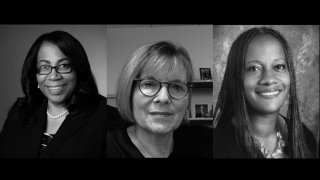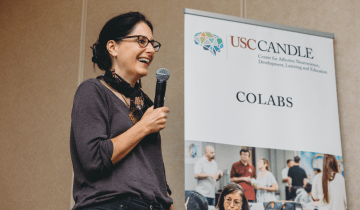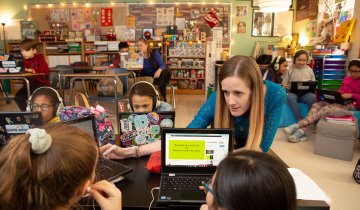Words can be powerful. They mediate problem solving and inquiry, express frustration and joy, and narrate psychosocial and cognitive growth. We often hear teachers gratuitously say, “use your words” to children grappling with frustration or a new idea.
However, the premium in many classrooms is not on words and the skills that grow from developing them. Many teaching paradigms focus on control at the expense of fostering collaboration or creativity. Even in the lower grades, classroom assignments and homework are the determining factors for measuring students’ achievement to a far greater degree than the quality of their questions or any demonstrated ability to self-advocate.
Studies on language acquisition show that impoverished children are exposed to millions fewer words than children from a higher socioeconomic status during their school years. This discrepancy has a direct correlation to the students’ abilities to participate in learning and social activities.
If we really want students to use their words, how are we helping them? How are schools implementing and promoting curricula that truly value asking the “why” and “how” questions? And how are teachers carving out time to answer these questions as teachable moments?
The ramifications go well beyond the classroom walls. Words are important for citizenship in a democratic society. Words are power.
Communication in a wide range of written and verbal formats is at the foundation of learning, but as a pedagogical strategy it is a small and mostly unintentional part of the K-12 curriculum.
We need to adopt a problem-based curriculum, where students work together on social issues as they simultaneously learn subject matter content. This kind of pedagogy would integrate the “intangibles” of culturally relevant teaching by building empowerment, communication skills and resilience. It would give students permission to explore solutions inquisitively while also building the esteem needed to become powerful learners and citizens.
Right now these ideas are often part of lofty dialogues in teacher education classes. By transforming them into action in instruction we will be emboldening our students’ voices and ensuring brighter futures in and outside of the classroom.
Margo Pensavalle is Professor of Clinical Education at USC Rossier. Previously, she taught elementary and special education for 16 years in hard-to-staff schools in Boston and Los Angeles.
Angela Laila Hasan is Associate Professor of Clinical Education at USC Rossier. She has directed the Mathematics Educator Leadership Institute and is a pioneer in effective research-based parent involvement programs.
Shilby Sims (EdD ’08) is Principal at Western Avenue Elementary School in the Los Angeles Unified School District and an adjunct faculty member at USC Rossier.





